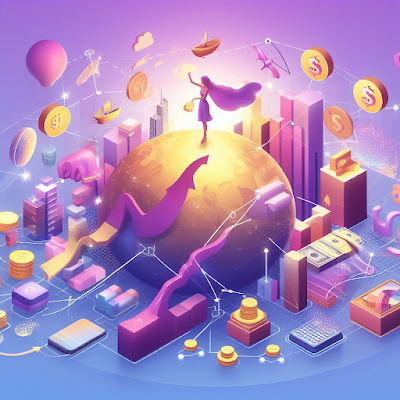How Inflation Affects Startups in 2023: A Business Consultant Perspective
Key Takeaways:
- Inflation can have both positive and negative impacts on startups, depending on their industry, market, and strategy. Startups should understand how inflation affects their business and customers, and adapt accordingly.
- Startups can use inflation to their advantage by creating value for their customers, optimizing their supply chain and operations, and seeking flexible and creative financing options. Startups can turn inflation into an opportunity to innovate, differentiate, and grow.
Inflation is a hot topic in 2023, as the US economy faces the highest inflation rate in four decades. But how does inflation affect startups, and what can they do to survive and thrive in this challenging environment? Here are some insights from a business consultant perspective.
Watch: Are You Working On or In the Business?
Inflation is the general increase in the prices of goods and services over time. It reduces the purchasing power of money and erodes the value of savings. It also affects the cost of production, the availability of supplies, and the demand for products. Inflation can have both positive and negative impacts on startups, depending on their industry, market, and strategy.
Some of the pros of inflation for startups are:
- It can create opportunities for innovation and differentiation. Startups that can offer solutions to the problems caused by inflation, such as supply chain disruptions, rising costs, or changing consumer preferences, can gain a competitive edge and attract more customers.
- For example, Costco, the wholesale retailer, has been able to use its economies of scale and strong bargaining power to keep its costs low and pass on the savings to its customers. Costco also benefits from its membership model, which generates recurring revenue and loyal customers.
- It can increase the value of assets and equity. Startups that own tangible assets, such as real estate, equipment, or inventory, can benefit from their appreciation in an inflationary environment. Similarly, startups that raise equity funding can enjoy higher valuations and lower dilution.
- For example, Netflix, the streaming giant, has been able to raise its prices without losing subscribers, thanks to its high-quality content and strong brand loyalty. Netflix also benefits from its global presence and diversified revenue streams, which help it hedge against currency fluctuations and regional shocks.
- It can reduce the real cost of debt. Startups that borrow money at fixed interest rates can pay back their loans with cheaper dollars in the future. This can lower their debt burden and improve their cash flow.
- For example, McDonald’s, the fast-food chain, has been able to cope with inflation by using technology and innovation to improve its efficiency and customer experience. McDonald’s has invested in digital ordering, delivery, drive-thru, and loyalty programs, which have boosted its sales and margins.
Some of the cons of inflation for startups are:
- It can reduce consumer spending and demand. Inflation can erode the purchasing power and confidence of consumers, leading them to cut back on discretionary spending and postpone big purchases. This can hurt the sales and profitability of startups that rely on consumer demand.
- For example, Delta Air Lines, the airline industry leader, has been hit hard by inflation, especially the rising fuel prices, which account for a significant portion of their operating costs. Delta also faces lower demand and higher competition from low-cost carriers and alternative modes of transportation.
- It can increase operational costs and uncertainty. Inflation can drive up the prices of inputs, such as raw materials, labor, energy, and transportation. This can squeeze the margins and cash flow of startups that cannot pass on the cost increases to their customers. Inflation can also create uncertainty and volatility in the market, making it harder for startups to plan and budget.
- For example, Starbucks, the coffee chain giant, has been struggling with inflation, especially the rising costs of coffee beans, dairy products, labor, and transportation. Starbucks also faces lower foot traffic and consumer spending due to the pandemic and social distancing measures.
- It can raise the cost of capital and financing. Inflation can prompt the central bank to raise interest rates to curb inflationary pressures. This can increase the cost of borrowing for startups that need debt financing. It can also affect the availability and terms of equity financing, as investors may demand higher returns or more protection.
- For example, Nike, the sportswear giant, has been suffering from inflation, especially the rising costs of raw materials, labor, shipping, and tariffs. Nike also faces supply chain disruptions and inventory shortages due to the pandemic and geopolitical tensions.
To use inflation to their advantage, startups can do the following:
- Adapt to changing customer needs and preferences. Startups should monitor how inflation affects their target market and customer segments, and adjust their value proposition, pricing strategy, marketing mix, and product development accordingly. They should also look for ways to create value for their customers by solving their pain points or enhancing their benefits.
- Optimize their supply chain and operations. Startups should review their supply chain and operations, and identify areas where they can reduce costs, improve efficiency, or mitigate risks. They should also diversify their sources of supply, negotiate better terms with their suppliers, or switch to cheaper or more reliable alternatives.
- Seek flexible and creative financing options. Startups should explore different ways to finance their growth and operations in an inflationary environment. They should consider using a mix of debt and equity financing, depending on their stage, industry, and goals. They should also look for alternative sources of funding, such as grants, crowdfunding, or partnerships.
Inflation is a reality that startups have to face in 2023. But it is not necessarily a doom-and-gloom scenario. By understanding its impacts and implications, startups can turn inflation into an opportunity to innovate, differentiate, and grow.

0 Comments